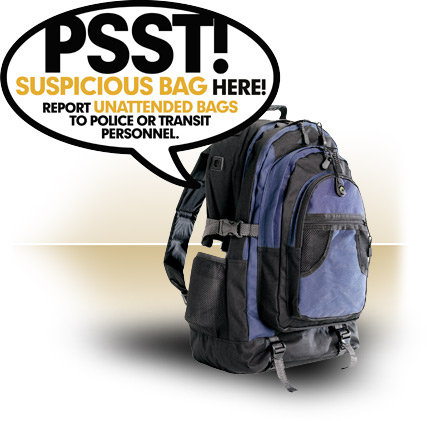PREVENT TERRORISM
Early recognition and reporting of potential terrorist activities is the first line of defense against attacks. Be aware of what is going on around you. Whether traveling, at work or at home, be on the look out for suspicious activities. The eight signs of terrorism include:
Recording or monitoring activitieslike daily routines of transit employees and security procedures. Taking photos or drawing diagrams of security equipment, tracks or unauthorized areas.
Attempts to gain information about operations, staffing and security related to their target. Questions may be asked by email, mail, on the phone or in person. Some individuals may attempt to gain employment with mass transit agencies without the proper background or qualifications.
Any attempt to measure reaction times, from the public or security, to unattended items or gained entrance to restricted areas. Measuring the time it takes for security or police to arrive to a scene.
Terrorist not only raise money, they also transfer and spend it in ways that don’t attract attention to themselves. Any unusually large cash transactions or exchanges for large amounts of gift cards are cause for suspicion.
Terrorist need a range of supplies to carry out an attack. Obtaining explosives or weapons, or purchases of a large amount of one time use cell phones could be cause for suspicion. Stealing or obtaining uniforms, badges or credentials used to impersonate transit personnel, security or police should also be reported.
Suspicious people out of place due to what they say or do. This includes people who are in places they should not be, as well as people who do not fit in the daily routine of your neighborhood or community. Terrorist may impersonate police, mail carriers or transit employees to gain information.
Terrorist will often perform multiple trial runs, without actually committing a terrorist act, to ensure their plan will run smoothly. This includes rehearsing action steps and putting people into positions for practice.
People and supplies getting into position, or that are in the midst of an attack. Report any imminent threats or attacks to the police by calling 911.
Terrorists target locations where they can leave objects and equipment undetected and unreported. Dim hallways and corners or trash bins that aren’t regularly emptied and maintained can be magnets for unsavory behavior. Take an active part in protecting your community and deterring crime and terrorism.
- Put garbage in trash cans and do not litter.
- Be observant and report any suspicious behavior or unattended items.
- Trash cans need to be emptied.
- Lightbulbs need to be replaced.
- Any other regular maintenance that needs attention.

WITH TRANSIT AUTHORITIES
Our national security is a shared responsibility and we each need to do our part to extend the reach of law enforcement and security personnel. Part of that is maintaining an open flow of communication between you and the transit authorities you ride.
Be receptive to the information shared with you, and be prepared to share information with transit authorities.
Here are a few easy ways to stay connected:


Virginia Railway Express (VRE)
For an entire list of partners click here »

